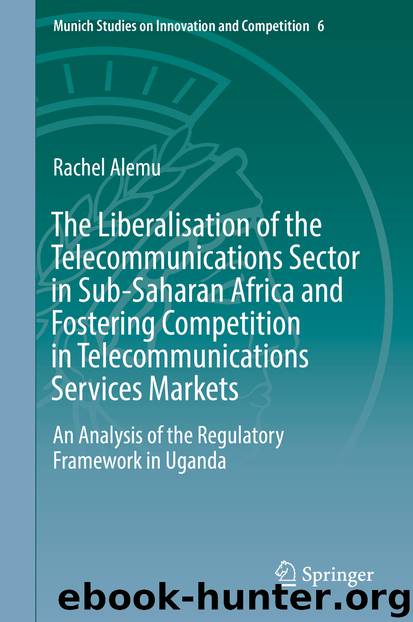The Liberalisation of the Telecommunications Sector in Sub-Saharan Africa and Fostering Competition in Telecommunications Services Markets by Rachel Alemu

Author:Rachel Alemu
Language: eng
Format: epub
Publisher: Springer Berlin Heidelberg, Berlin, Heidelberg
5.8 Conclusion
This chapter has set out to establish whether the provisions Uganda’s legislation on anti-competitive behaviour provide sufficient measures to enable the UCC to prevent or mitigate anti-competitive consequences related to cross-border mergers. The successful implementation of the liberalisation policy in Uganda’s telecommunications sector has been effective due to significant FDI flows into the telecommunications sector. This is evidenced by the strong presence of local subsidiaries in Uganda’s telecommunications markets. FDI flows into Uganda’s telecommunications sector have primarily taken the form of greenfield investment. However, within the last decade, a number of cross-border mergers of a Sub-Saharan Africa dimension have been concluded, some of which have affected the market structure in Uganda’s telecommunications sector.
The rise in the number of cross-border mergers affecting Uganda’s telecommunications sector points to the need to have an effective merger control regime in place to ensure that the transactions do not adversely affect competition in the sector. It is also very important for a developing country to have a competition authority with the requisite capacity to effectively enforce national competition law against anti-competitive cross-border and mergers. Therefore, the chapter has focused on two key issues: (1) whether the merger control provisions are comprehensive enough, and (2) whether the competition law enforcement framework is effective.
The analysis of the merger control provisions for the telecommunications sector in Uganda illustrates that the current regime is not adequate for purposes of assessing cross-border mergers with anti-competitive effects. The existing regime provides basic provisions prohibiting anti-competitive mergers and acquisitions but fails to offer comprehensive guidance on how the UCC should implement the provisions. Given the UCC lacks of experience regulating anti-competitive behaviour, the absence of clear criteria enabling the UCC to distinguish what element of a cross-border makes it anti-competitive only serves to make it more challenging for the UCC to fulfil its mandate.
Of greater significance is the indication that exclusive reliance on sector-specific competition rules is inadequate for purposes of effectively regulating cross-border mergers and acquisitions affecting the market structure in Uganda’s telecommunications sector. The UCC’s jurisdiction only applies to firms that are licensed to provide communications services. This limits the power and range of remedies available to the UCC particularly with regard to cross-border conduct. On the other hand, the enactment of a national competition law of economy-wide application would provide the competition authority with a broad scope for enforcement of the provisions encompassing cross-sector and cross-border conduct. Notably, the draft Competition Bill provides for extra-territorial application of its provisions which might be useful for purposes of investigating and prosecuting anti-competitive cross-border practices affecting competition in Uganda’s telecommunications sector.
This chapter has also touched upon the potential role of regional competition laws to facilitate effective regulation of cross-border mergers. Critical for ensuring effective regulation of cross-border mergers is having sufficient resources, both human and financial, to effectively undertake the tasks needed to effectively enforce the merger control provisions.243 Within Sub-Saharan Africa, it has been observed that national competition authorities lack capacity to effectively enforce competition legislation particularly in connection with cross-border conduct.
Download
This site does not store any files on its server. We only index and link to content provided by other sites. Please contact the content providers to delete copyright contents if any and email us, we'll remove relevant links or contents immediately.
The Pirates of Somalia by Jay Bahadur(1618)
Political Theology by Carl Schmitt(1567)
The Holocaust: A New History by Laurence Rees(1504)
The Social Animal by David Brooks(1447)
A Practical Guide to International Arbitration in London by Hilary Heilbron(1422)
Restitution by Restitution(1422)
Pirates of Somalia by Jay Bahadur(1372)
Coercing Virtue by Robert H. Bork(1353)
The Nuremberg Interviews by Leon Goldensohn(1291)
Basic International Corporate Taxation by Sebastiano Garufi(1202)
A History Of Thailand by Baker Chris(1172)
The Global Commons by Susan J. Buck(1131)
International Trade and Business: Law, Policy and Ethics by Gabriël Moens & Peter Gillies(1130)
Asian Waters by Humphrey Hawksley(1109)
Blood Profits by Vanessa Neumann(1105)
The Sovereignty of Human Rights by Macklem Patrick(1104)
Spring Fever: The Illusion of Islamic Democracy by McCarthy Andrew C(1095)
The Nuremberg Trials: The Nazis and their Crimes Against Humanity by Roland Paul(1041)
Crimes Against Humanity: Historical Evolution and Contemporary Application by M. Cherif Bassiouni(1016)
